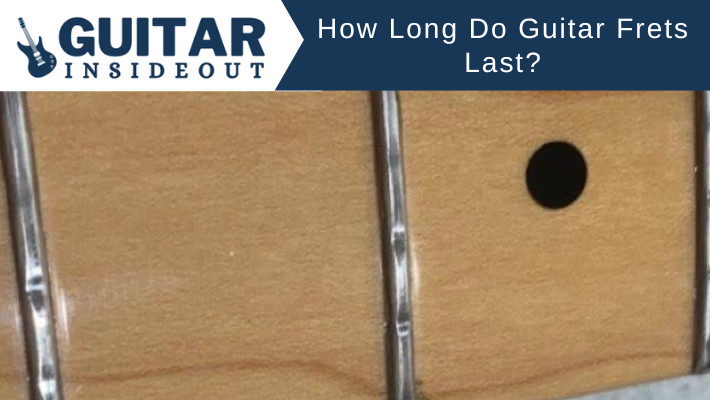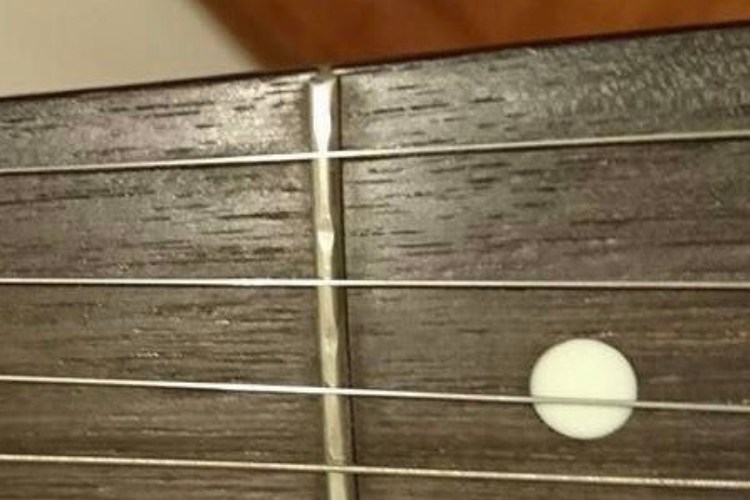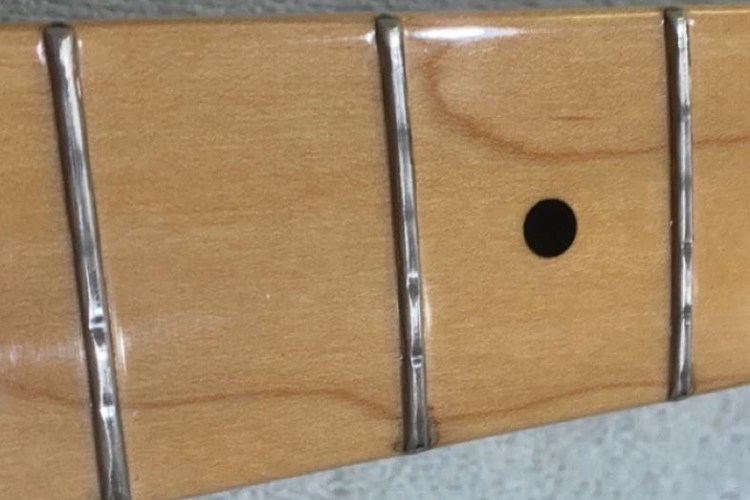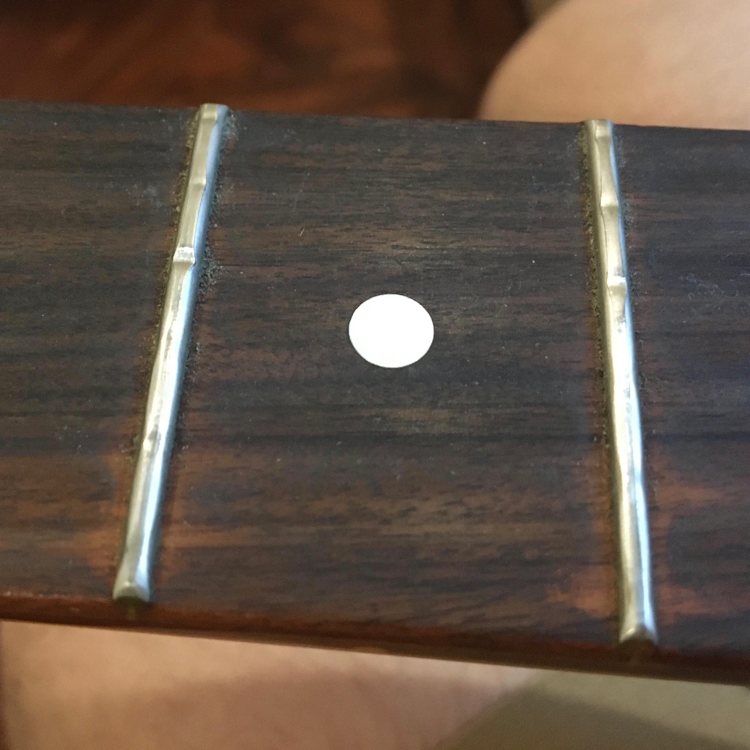Guitar frets don’t last forever. Depending on how much you play they will get worn down and eventually need replacing.
But it can help to know how long guitar frets last. You might want to plan for the future or see if you’re frets are wearing out faster than others.

Well we’ll take a look at how long frets last, what causes the frets to wear and how to maintain them to
How Long do Guitar Frets Last
It all depends on how much the guitar is played and how it is played. If you only pick up your guitar once a week and lightly strum it for 20 minutes the frets will probably last forever.
If you play 4 hours every single day, really grip the guitar neck hard, do lots of bends and vibrato etc. your frets will get worn quickly and have a much shorter life.
So it’s impossible to put a specific figure of months or years on how long frets last. But there are things that contribute to the lifespan of a fret.
What Affects How Long Frets Last
There are quite a few factors that influence how long a guitars frets last.
Style of Play
Probably the most important factor in fret wear is the way you play the guitar. Having a really heavy touch means you’re really jamming the strings down hard against the frets, which results in greater wear.
The same applies if you’re using a lot of vibrato and bends when you play. Depending on the type of music you play that can be hard to avoid. If a song needs vibrato you’ve got to use it.
But how you’re playing your guitar is going to have the greatest impact on the length of time the frets last.
Length of Time Playing
This can be tricky to deal with because you want to play the instrument, right? And it requires constant practice, the more the better.
But there’s no doubt that the more you play your guitar the quicker the frets will wear out. That’s no reason to stop or reduce the amount you play but it’s worth mentioning.
Fret Material
Frets are made from different materials. The most common is nickel but you also get stainless steel, brass and more.
Some of these are more durable and wear down less than others. For example nickel frets are the most common and found on the majority of guitars.
But stainless steels frets are tougher and definitely last a lot longer. The problem is that for most people that means you’ll have to get your nickel ones replaced, which is a pretty big and expensive job.

Capo Use
Capo’s are one of the biggest culprits for causing fret wear. When you place a capo on your guitar it puts a lot of pressure onto the strings – far more than your fingers can manage.
It’s constant as well. Our fingers move around when we play but a capo just sits doing one thing continuously: holding down the strings.
That constant pressure causes the strings to really dig into the frets and leads to increased fret wear.
String Gauge
Heavier gauge strings may sound better but they definitely dig into frets more than lighter gauge ones. The thicker string being pushed down onto the fret really digs in.
You also have to use more force to hold down heavier strings which in turn causes more wear.
Hand Sweat and Oils
Sweat from your hands causes both the strings to corrode and rust, which wears the frets quicker. But also the sweat directly from your fingers on to the frets will corrode and wear them too.
How Do You Know if Frets Need Replacing?
You have to judge if your frets need replacing mainly by sight. If they look worn – grooves, divots or furrows where the strings hit the frets – then they will probably need some work.
That might not necessarily be a complete refret and replacement. You can do a fret dressing or levelling that involves filing down the tops of the frets
The other way to decide if your frets might need some work is how your guitar plays. If you’re getting a lot of fret buzz, strings are rattling and notes are muting or fretting out it may be because of worn frets.
It could be something else of course. But when frets get worn down it means the strings are lower and closer to the fretboard. This can cause things like unexpected fret buzz and notes not sounding.

How Much Fret Wear is too Much?
It’s very personal but essentially comes down to the playability of the guitar. If it still plays well, notes sound fine, there are no issues with bends fretting out or string buzz then there shouldn’t be any cause for concern.
But if worn frets are causing any of those problems then it may have become too much of an issue. You’ll have to judge it yourself but when fret wear affects how the guitar sounds and plays it’s usually time for a fret levelling or refret.
Do Coated Strings Help Frets Last Longer?
Unfortunately not. The plastic coating on the strings do not really make much of a difference and when it wears away you’re left with regular strings anyway.
They may have other positives or you just like the way they feel but don’t switch to coated strings because you think they will help your frets to survive for longer.
How to Maintain Frets
In order to help your frets last as long as possible you can take action to reduce the amount of wear on them.
Adjust Playing Style
You should try to work on getting as light a touch as possible. This will not only make your frets last longer but also help with your playing too.
You don’t need nearly as much pressure as you think you do. A good exercise is to place your fingers on the strings and push down with just enough force to fret them. That is all the pressure you need and should be what you aim for.
Keep trying to play with that amount of force. It takes time to get used to it but in the long run it helps you to save your frets and play faster.
Get a Good Setup
The action on your guitar has an affect on the frets. High action often means you having to really grip your strings hard and a lot of effort to hold them down. This will absolutely wear your frets down quicker than if you had lower action.
A good setup, either by yourself or a guitar tech, will not only make playing it more enjoyable and easier but help it’s frets to stay in good condition for as long as they can.

Wash Hands
Before you play try to get into the habit of washing your hands. It will stop sweat and dirt building up on the strings and fretboard.
Use Lighter Gauge Strings
Not always an option but if you can then switching to a lighter gauge of strings will help prolong your frets. Lighter strings don’t dig into the frets nearly as much as heavier one’s and they require far less effort to hold down, also reducing the friction and wear of the frets.
Clean Strings
When you finish playing don’t forget to wipe your strings before putting the guitar away. Removing any build up of sweat, oil from your hands and dirt will help your strings to last longer and protect the frets from degrading.
Less Use of a Capo
If you’re a frequent capo user you will definitely wear down your frets pretty quickly. The pressure they put on the frets is a sure fired way to wear your frets.
If you can, and that might be a big if, use the capo less often. Your frets will thank you!
Polish Frets
Polishing frets can make them look a lot nicer as well as extending their life. The oil and sweat from your fingers as well as dust can build up on the fretboard, stain the frets and cause them to wear.
If you polish them on a regular basis you can keep them smooth and stop the dirt and swear from tarnishing and wearing them down.